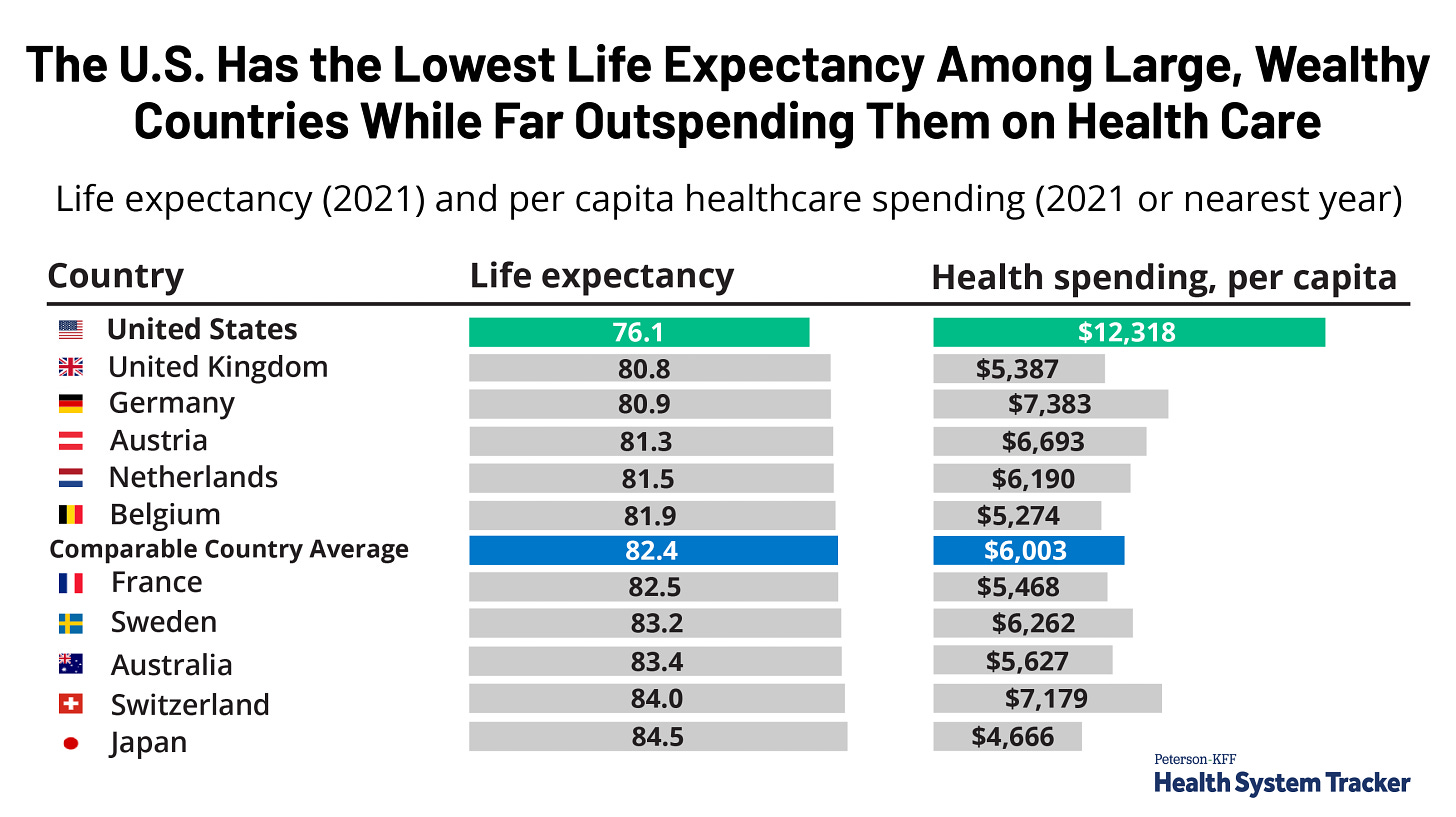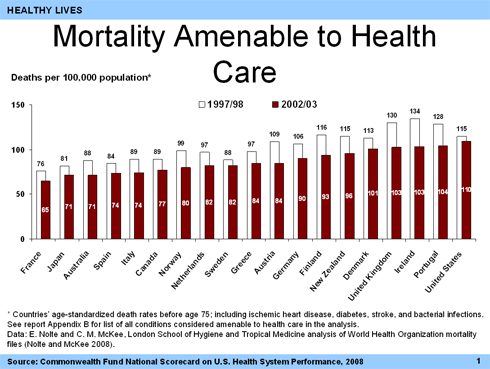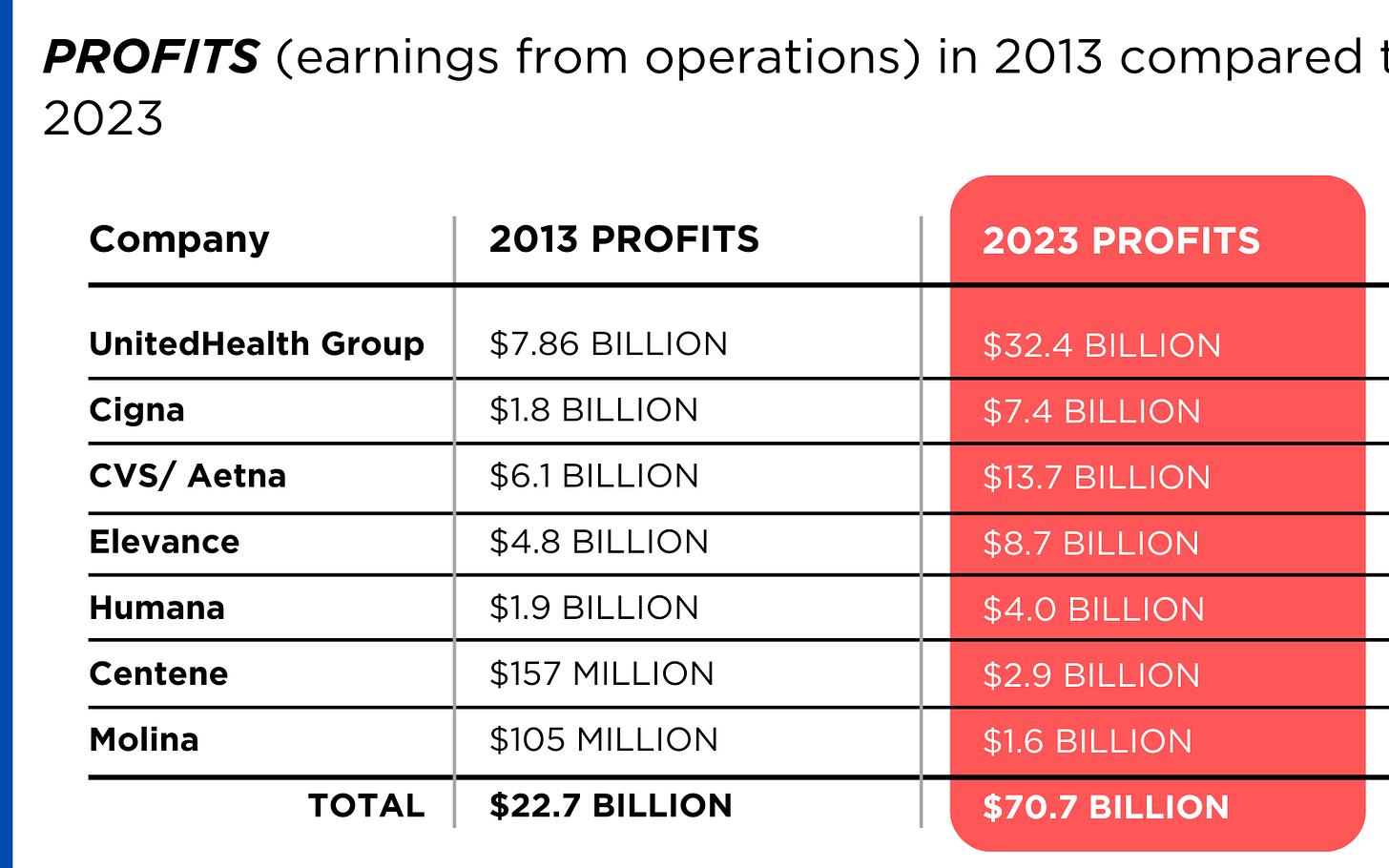A Democrat's Guide To Discussing Universal Healthcare
Why Universal Healthcare is a necessity, not a luxury.
The Luigi Mangione incident has thrust the healthcare debate into the spotlight in a way few events have before. While the tragic killing of UnitedHealthcare CEO Brian Thompson cannot be justified, the outpouring of support for Mangione—across political lines—reveals something deeper: a simmering class consciousness fueled by frustration with a broken system. Healthcare is no longer just a political talking point; it’s a lived crisis for millions of Americans, and the resonance of this incident shows the urgent need for real solutions.
Now, more than ever, we must discuss the state of our healthcare industry and its failings. The US remains the ONLY developed nation without universal healthcare, with millions uninsured or underinsured, medical bankruptcy rampant, and life expectancy lagging behind other industrialized countries. Meanwhile, health insurance executives and pharmaceutical companies rake in record profits, often at the expense of patients’ well-being. These disparities have created anger and disillusionment, cutting across traditional party lines.
Mangione’s controversial rise as a folk hero isn’t just a symptom of societal frustration but a rallying cry to address the systemic issues underpinning our healthcare system.
This guide aims to arm Democrats and progressives with the tools and talking points necessary to engage in this critical conversation. As the healthcare industry invests heavily in propaganda to maintain the status quo, we must be prepared to counter misinformation and advocate for bold solutions like universal healthcare or single-payer systems. These reforms would save lives and create a more equitable society by ensuring that healthcare is treated as a human right, not a commodity.
If you are new here, hyperlinks lead to sources.
The state of the American healthcare system.
Before we get started on facts and statistics, it’s important to note that however flawed America’s healthcare system is, in Texas, it’s much worse due to Republican’s failure to expand Medicaid.
In 2009, before the Affordable Care Act (ACA), a Harvard Study found that an average of 45,000 Americans were dying due to lack of health coverage. The national uninsured rate is 8.2% or 27.1 million people. In Texas, our uninsured rate is double the national rate, at 16.2% or 4.8 million people.
A 2019 study showed that medical costs create hardships for more than half of Americans. And 25% of Americans say they or a family member put off treatment for a serious medical condition because of the cost. In 2023, 63% of uninsured adults said they were uninsured because the cost of coverage was too high.
A US Government Accountability Office report released two weeks ago stated that healthcare experts warn that insurance costs will likely rise again in 2025. Skyrocketing premiums, deductibles, and prescription drug costs will continue for the foreseeable future.
How do we compare to other countries?
In 2023, the cost of healthcare in the United States was $4.9 trillion, or $14,570 per person. This was a 7.5% increase from 2022 and accounted for 17.6% of the nation’s Gross Domestic Product (GDP). The United States has the highest healthcare costs in the world, spending almost twice as much per person as other wealthy countries.
The US spends more than twice as much per capita annually on retail prescription drugs than other developed nations. According to multiple studies, the United States generally has the worst health outcomes compared to other developed countries despite spending the most on healthcare per capita.
The United States has a lower life expectancy than many other countries.
The United States has higher rates of preventable deaths than other countries.
The United States has poor outcomes compared to other nations in:
So, why are prices skyrocketing while health outcomes are near the worst among developed nations?
Because the profits for the middle-men (insurance industry) have exploded.
The data paints a stark picture of a healthcare system failing millions of Americans. For those who have had to navigate the labyrinth of insurance bureaucracy, delay critical treatments due to cost, or lose loved ones because they couldn’t afford care, the symbolism of Luigi Mangione is likely all too familiar. His controversial actions encapsulate the anger and despair felt by many who see the system as prioritizing corporate profits over human lives.
Why Universal Healthcare? The moral argument.
Healthcare is a human right, not a privilege tied to employment or wealth. The right to health was first recognized in the 1946 World Health Organization (WHO) constitution, which states that “the enjoyment of the highest attainable standard of health is one of the fundamental rights of every human being without distinction of race, religion, political belief, economic or social condition. The Universal Declaration of Human Rights in 1948 and the International Covenant on Economic, Social, and Cultural Rights (ICESCR) affirmed the right to health in 1966.
Our government champions human rights worldwide, insisting that other countries protect them and even imposing sanctions for failure to do so. However, our government is less robust in protecting rights at home. The right to health care has long been recognized internationally. The United States is one of the only developed countries that does not explicitly recognize healthcare as a fundamental human right. More than half of the world’s countries have the right to public health and medical care written into their national constitutions.
Everyone deserves equal access to healthcare, regardless of socioeconomic status, as it is essential for maintaining health and dignity. Lower-income and working Americans suffer because they cannot afford health insurance. This exacerbates cycles of poverty, limits economic mobility, and worsens health disparities. Ensuring universal healthcare isn’t just about fairness; it’s about building a society where everyone can live a healthy, dignified life, free from the fear of medical bankruptcy or neglect.
Why Universal Healthcare? The economic argument.
A study by Yale epidemiologists found that Medicare for All would save approximately 68,000 lives annually while reducing US healthcare spending by roughly 13%, or $450 billion annually. Another study by the Koch-funded Mercatus Center found that Medicare for All would save around $2 trillion over 10 years.
These savings come primarily from cutting administrative costs, eliminating the need for profit margins in private insurance, and negotiating drug prices at a national level. Private insurers spend billions on advertising, executive salaries, and shareholder dividends—costs that would be eliminated under a single-payer system. Furthermore, by providing preventative care to all, universal healthcare would reduce the financial burden of treating advanced diseases and emergency care that arise from delayed treatments.
Medicare for All would also improve labor market efficiency. Tying health insurance to employment restricts job mobility and forces many to stay in jobs they dislike to retain coverage. A universal system would free workers to pursue opportunities that better align with their skills and ambitions, potentially boosting productivity and innovation. Small businesses would also benefit, as they would no longer face the financial burden of providing health insurance to employees.
The economic argument for universal healthcare is clear: it would save lives, reduce costs, and foster a more dynamic and equitable economy.
But socialized medicine will ruin healthcare.
One of the most common misconceptions about universal healthcare is that it equates to “socialized medicine,” where the government owns and operates all healthcare services. However, most universal healthcare systems worldwide do not follow this model. Instead, they maintain a mix of public and private providers, ensuring patient choice and competition while guaranteeing universal access.
For example, Germany operates a multi-payer healthcare system where public and private insurers provide coverage. Employers and employees contribute to sickness funds, which cover medical expenses. The system emphasizes affordability, efficiency, and universal access without eliminating private healthcare options.
Japan’s system, often lauded for its high-quality care and affordability, is also a hybrid model. It features a government-mandated universal insurance scheme with private providers delivering care. Patients pay modest out-of-pocket fees capped to prevent financial hardship.
Canada has a single-payer system. The government funds healthcare through taxes, but private practitioners and hospitals deliver services. While some critics point to wait times in Canada, studies show that patient satisfaction and health outcomes are consistently high compared to the US.
But won’t universal healthcare give us longer wait times and lower-quality services?
Many studies have been done on wait times for coverage in America compared to other nations, like this one, which shows that the current US healthcare system already involves long wait times for many patients and does not ensure that all patients have health insurance coverage.
Another study by the Commonwealth Fund compared America’s wait time to that of ten other countries. America ranked last on performance overall, including on wait times. We rank last or second to last in timeliness when it comes to seeing a doctor or nurse the same day we request it, obtaining after-hours care, and even waiting for a doctor to call us back.
Countries with universal healthcare systems often outperform the US regarding patient satisfaction and health outcomes. For example, Canada and the United Kingdom provide universal coverage and report higher satisfaction rates despite myths about lengthy delays. Wait times for critical procedures, such as cancer treatments or emergency care, are often shorter in countries with universal healthcare because these systems prioritize medical needs over the financial ability to pay.
In the US, wait times are often dictated by insurance approval processes, network restrictions, and financial barriers, leading to delays even for those with insurance. Universal healthcare eliminates many of these bureaucratic hurdles, streamlining access to care and ensuring timely treatment for all. The perception of longer wait times under universal healthcare comes from cherry-picked anecdotes rather than systemic evidence.
Is Luigi Mangione the catalyst for class consciousness?
Healthcare struggles transcend political affiliations, affecting individuals across all socioeconomic classes. Whether it’s a middle-class family drowning in medical debt, a working-class individual forced to skip treatment due to high deductibles, or an uninsured low-income patient relying on overcrowded emergency rooms, the cracks in the system impact everyone. Corporate greed has exacerbated these struggles, as profit-driven motives prioritize shareholder returns over patient care. Rising healthcare costs have widened the gap between the wealthy and the rest of society, making quality care increasingly out of reach for millions.
Luigi Mangione’s controversial heroization underscores a shared frustration with the healthcare system. While extreme, his actions resonate with many who feel trapped by a system prioritizing profits over human lives. Mangione’s story has sparked debates that bring class consciousness to the forefront, making him a symbol of economic and social justice.
This widespread discontent presents an opportunity to drive systemic reform. Advocates can build coalitions that cut across traditional political lines by focusing on shared frustrations rather than partisan divides. While universal healthcare may not happen under a Republican Congress that will prioritize corporate profits above all else, now is the time for the conversations to happen. So, when we vote for our Congressional and Senatorial representatives in 2026, we vote for officials who affirm that healthcare is a human right.
The Mangione incident reminds us that healthcare reform is not just a leftist agenda but a universal cause that resonates with people from all walks of life. Mobilizing this collective anger into constructive advocacy can help dismantle the profit-driven structures that have failed so many and push for a healthcare system that prioritizes equity, accessibility, and humanity.
The debate over healthcare in America is not just about policy—it’s about people’s lives.
The current system’s failures have left millions behind, creating unnecessary suffering and deepening inequalities. By embracing universal healthcare as both a moral and economic imperative, we can build a system that serves everyone, not just the wealthy few. The Luigi Mangione incident highlights the urgency of this fight, reminding us that change is not just possible but necessary. The time to act is now.
January 7: Joint Legislative Committee - Effects of Media on Minors
January 14: The 89th Legislative Session begins.
March 14: The last day Legislators can file bills.
June 2: The 89th Legislative Session ends.
LoneStarLeft is a reader-supported publication. To receive new posts and support my work, consider becoming a free or paid subscriber.
Follow me on Facebook, TikTok, Threads, YouTube, and Instagram.









let me say......healthcare indivisible FTW or Texas says nothing about this...no SR candidate talked about it, no SS candidate talked about it, no congressional candidate nor senate candidate, no state wide candidate talked about, no constable, RR commission, comptroller, treasurer, mayor, judicial candidate talked about it. No party chair or committee talked about it. No clergy or Sherriffs candidate talked about it.
About what? Medicaid Expansion and the 1.4m Texans uncovered. A program Oklahoma and Louisiana, Mo, Ark, a whole lot of other redneck shithead states have.
As someone seeing universal healthcare as a human right that should not be a partisan issue, I loved Michelle's well written and sourced article. Several related ones are referenced on my site here: https://MHealthTalk.com/policies/.